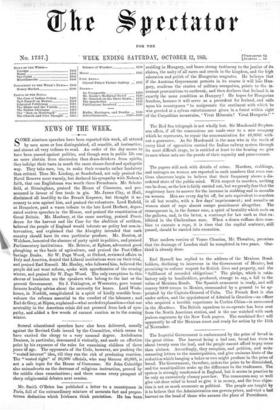NEWS OF THE WEEK.
COME nineteen speeches have been reported this week, all uttered by men more or less distinguished, all sensible, all instructive, and almost all very tedious to read. An order of the day seems to have been passed against politics, and though men in public life can no more abstain from discussion than dram-drinkers from spirits, they indulge their taste in much the same shame-faced and apologetic way. They take care, too, to make their remarks rather laudatory than critical. Thus Mr. Lindsay, at Sunderland, not only praised the Naval Reserve most warmly, but declared his sympathy with Nelson's faith, that one Englishman was worth three Frenchmen. Mr. Schole- field, at Birmingham, praised the House of Commons, and pro- nounced in favour of free trade in gin. Mr. James Clay, at Hull, disclaimed all hostility to the French Emperor, but thought it ne- cessary to arm against him, and praised the volunteers. Lord Enfield, at Hounslow, paid a warm tribute to the late Lord Herbert, depre- cated useless speeches in the House, and praised the constitution of Great Britain. Mr. Hanbury, at the same meeting, praised Provi- dence for the harvest and the Czar for the abolition of serfdom, believed the people of England would tolerate no policy but non-in- tervention, and explained that the Almighty intended that each country should have its own particular produce. Mr. Buxton, at Walsham, lamented the absence of party spirit in politics, and praised Parliamentary institutions. Mr. Briscoe, at Egham, advocated good ploughing as the basis of agriculture, and praised the Post-Office Savings Banks. Sir W. Page Wood, at Oxford, reviewed affairs in Italy and America, denied that Liberal institutions were on their trial, and praised Earl Russell. Mr. Henley, who followed him, believed the people did not want reform, spoke with apprehension of the coming winter, and praised Sir W. Page Wood. The only exceptions to this chorus of laudation are the speakers who belong to the last or the present Government. Sir J. Pakington, at Worcester, gave tenant farmers healthy advice about the necessity for leases. Lord Wode- house, in Norfolk, recapitulated in a spirit of kindly sensible bene- volence the reforms essential to the comfort of the labourer; and Earl de Grey, at Ripon, explained—what needed explanation—that our neutrality in the American crisis did not proceed from lack of sym- pathy, and added a few words of earnest caution as to the coming winter.






























